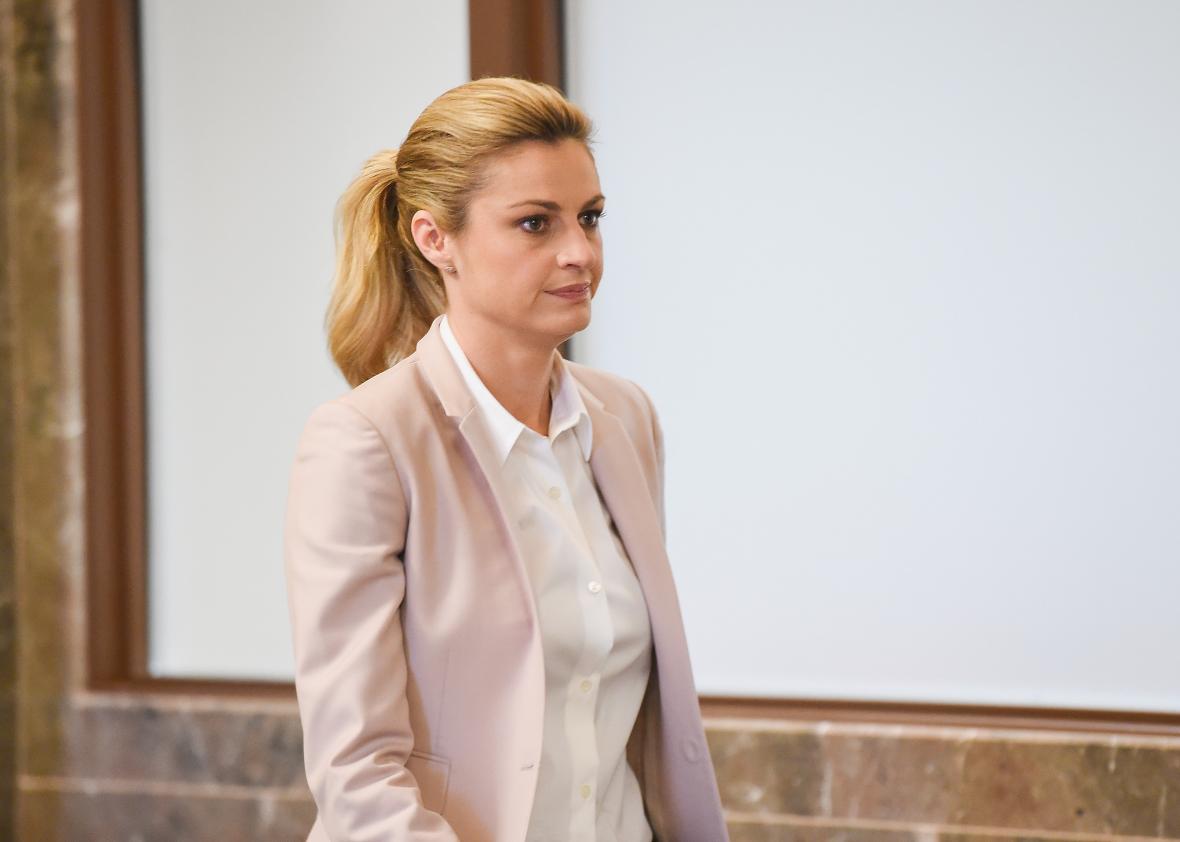For Erin Andrews, Stalking Was Just the First Trauma of Many

Photo by Erika Goldring/Getty Images
Fox sportscaster Erin Andrews testified on Monday that ESPN, her former employer, forced her to give an on-camera interview about the stalker who filmed her undressing through the peephole of a Nashville Marriott hotel room in 2008.
In court proceedings for the $75 million civil lawsuit Andrews filed against perpetrator Michael David Barrett and the hotel’s management and parent company, Andrews said her ESPN supervisors wanted to dispel rumors that the tapes, which were disseminated on the Internet in July 2009, were a publicity stunt. “Because there wasn’t an arrest, because we didn’t know where this happened, my bosses at ESPN told me, ‘before you go back on air for college football we need you to give a sit-down interview,’” Andrews testified. “And that was the only way I was going to be allowed back.”
Andrews said ESPN let her choose the show for the interview, though “they were highly recommending it be GMA [Good Morning America], because ESPN and ABC are the same.” She chose Oprah, in part because host Oprah Winfrey has been open about her history as a survivor of sexual abuse. Giving the interview was so traumatic, Andrews testified, that it gave her a rash. Backstage before the taping, Winfrey offered Andrews some comfort:
I was just freaking out, and I just said, “I don’t want to do this, I don’t want to do this. I just want to go back to college football. I don’t want to talk about what happened to me, why can’t I just be normal?” … I think her producer had heard me crying, and all of a sudden in walked Oprah, in her slippers, and her butterfly eyelashes. I didn’t have time to get up out of the chair, and she walked over to me, and I was hysterical. And she said, “I’ve got you, you’re safe here. I’ll take care of you.”
Andrews initially implicated Marriott International in the suit, but a judge ruled that the company could not be held responsible for security claims against a franchise owner. Barrett is a defendant in the suit and could be forced to pay damages; he pleaded guilty to interstate stalking three months after he posted the tapes online and served 30 months in prison. Andrews has accused the remaining defendants, the Nashville Marriott at Vanderbilt University and Windsor Capital Group, of giving Barrett her room number and adjacent accommodations.
Their defense is even more contemptible than ESPN’s implication that Andrews orchestrated a fake voyeur attack to gain publicity. The hotel’s lawyers are attempting to minimize the damages Andrews can claim by proving that Barrett’s violation boosted, not harmed, her career. A defense attorney told Andrews on the stand that the hotel did not deny that the attack happened. But the defense took her through a cross-examination that focused on her post-2009 career success, including a lucrative move to Fox, TV hosting gigs, and several corporate endorsement contracts, suggesting that Andrews reaped tangible financial benefits from the public trauma she suffered. "You have done very well in your career since 2009?" attorney Marc Dedman asked. Sports law analyst Exavier Pope, who’s been live-tweeting the trial, has done an admirable job countering some arguments that support the hotel’s defense. “@ErinAndrews hard work, experience, perseverance, resilience opened doors for her,” he wrote.
Andrews said as much in the Oprah interview, explaining why she immersed herself in her work after the incident:
I also feel it's my duty to come out and show [the person who filmed me]: “You know what? I worked hard for my career, and I got there the right way, and you're not going to break me down.” I also feel it's my responsibility for…other victims of video voyeurism to just come out and say: “Look, I'm going to show my face. I'm going to get back to work. Let's do it. You can too.”
Andrews is still suffering the damages of Barrett’s crime. “If I'm in a hotel or in my house, I feel like I'm being videotaped," she said in the August 2009 interview. Even now, she testified on Tuesday, she switches rooms immediately after checking into a hotel and combs the new room for recording devices. She says she battles daily harassment from viewers who tell her they’ve watched the nonconsensual tape. And this week, she’s had to sit on the stand to prove to a panel of people who’ve watched the footage, plus a video deposition from Barrett, that she has indeed been hurt by the hotel’s indiscretions.
ESPN has released a statement denying any wrongdoing: “Developments in the case have been interpreted by some to mean that ESPN was unsupportive of Erin in the aftermath of her ordeal,” the network told Sports Illustrated’s Richard Deitsch. “Nothing could be further from the truth. We have been and continue to be supportive of Erin.” Considering that Andrews’ testimony all but called ESPN unsupportive, the network is either calling her a liar or claiming to know more about her experience as a victim than she does. Andrews has built a fruitful career in spite of the videos, not because of them; the fact that ESPN allegedly compelled her to prove to the public that it was a real attack, not a publicity stunt, shows that the network was worried that the incident could harm her continued success. If anyone profited from Andrews’ exploitation, it’s ESPN.

